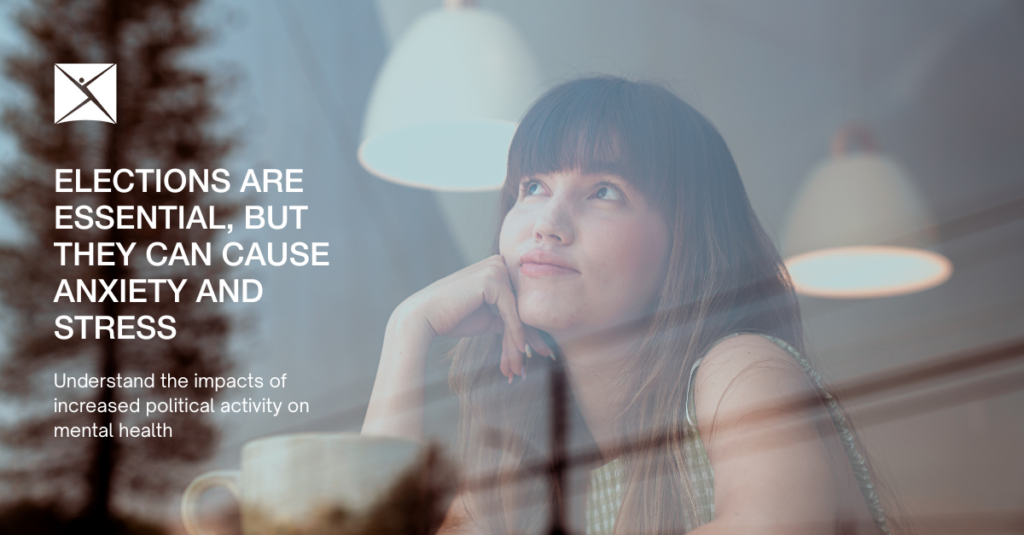Menu Close

Election anxiety: What is it and how to cope
Apr 23, 2025
Disclaimer: The research referenced in this post is based on studies conducted in the United States and the United Kingdom. While the findings offer useful insights, the experiences of Canadian citizens may differ due to cultural, political and systemic differences.
That stress and anxiety you feel in the lead-up to an election may just be “political anxiety.” Different from general anxiety, political anxiety tends to spike around election cycles and can negatively impact both mental and physical health. As Canadians prepare to head to the polls on April 28 to elect a new federal government, the overwhelming flow of news, commentary and information can make it hard to maintain a healthy perspective.
Interest in the topic of political anxiety has grown since the 2016 American presidential election. Over the past decade, studies have explored its causes, how it develops, and who it affects most. In that time, political anxiety also has been on the rise, especially among younger people.
- In 2024, 69% of survey respondents said politics caused significant stress, up from 52% in 2016.[1]
- A 2024 online survey by Forbes Health found that 66% of Gen Z, 64% of Millennials and 63% of Gen X participants felt their mental health was moderately or significantly affected.[2]
Political anxiety can cause insomnia, obsessive or intrusive thoughts, emotional dysregulation and high stress levels. These symptoms often worsen during election cycles. A 2023 study revealed:
- 14% of respondents engaged in emotional eating
- 9% used alcohol or substances
- 21% distanced themselves from friends or family with opposing political views[3]
In three separate studies, 1 in 20 people reported being so overwhelmed by political stress that they had considered suicide[CA1] .[4]
The sheer volume of content – from media coverage, political campaign ads, social media and even everyday social interactions – contributes to increased political anxiety. This constant exposure also feeds a growing issue: partisan polarization.
- A 2023 study from Cambridge University found that people living in areas of high political polarization reported worsening mental and physical health.[5]
- When individuals felt politically out of step with their community, they experienced increased anxiety and fear which was sometimes intense enough to prompt them to move. This was most common among vulnerable populations.[6]
- Political orientation appears to matter. Those with conservative or right-leaning beliefs tended to report lower levels of political anxiety than those with more liberal or left-leaning beliefs.[7]
Elections are an essential part of democracy, and informed voting is critical to shaping our nation. However, it’s also important to protect your well-being. Here are a few ways to manage political and election-related anxiety[8]:
- Set healthy boundaries for media and social media consumption.
- Choose reputable news sources and try to avoid sensationalist media when possible. If a headline or article sparks a strong emotional reaction, it was probably designed to do just that.
- Remember, voting and elections are not competitions. Politicians are public servants. Even if the winning candidate is not who you’d hoped for, your voice still matters on the issues you care about.
- Practice self-care when you are feeling anxious or stressed.
- Get involved: Talk about your feelings with those around you. The idea that politics shouldn’t be discussed is outdated; practice having respectful and open conversations about the issues that are important to you.
Help is available If you or someone you know is experiencing a mental health crisis, contact Here 24/7 at 1-844-437-3247.
If you’re thinking of suicide or worried about someone you know, call or text 9-8-8 (toll-free) anytime for support.
To learn about the programs, services and supports offered by CMHA Waterloo Wellington, visit www.cmhaww.ca.
[1] (Abrams 2024)
[2] (Prendergast 2024)
[3] (Prendergast 2024)
[4] (Abrams 2024)
[5] (Fraser, et al. 2022)
[6] (Fraser, et al. 2022)
[7] (Abrams 2024)
[8] (Perkins and Jason 2022)